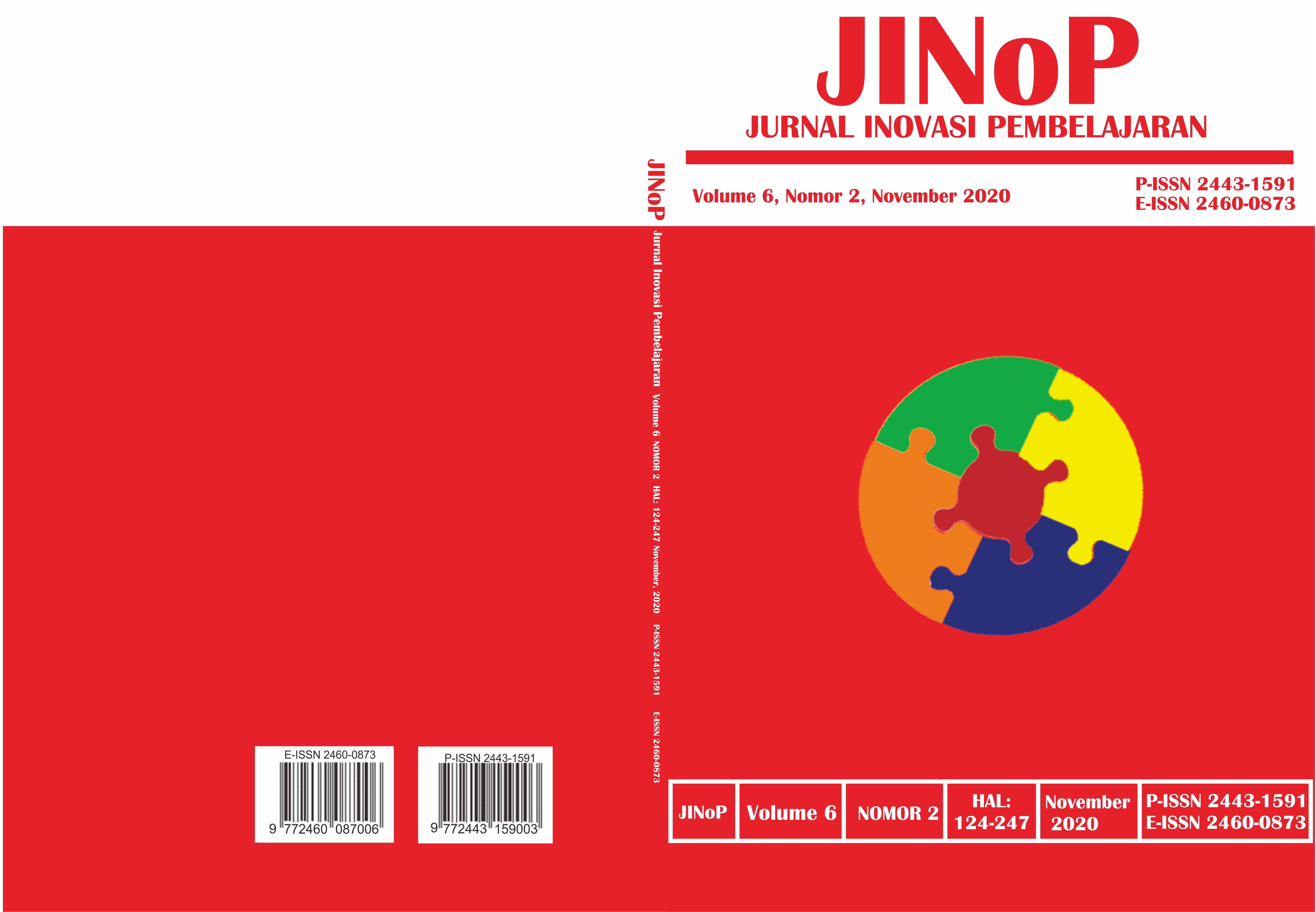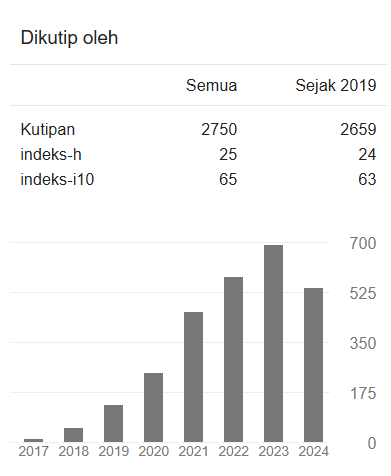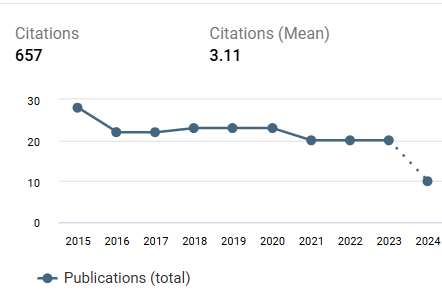Pengaruh model pembelajaran RADEC terhadap keterampilan berpikir tingkat tinggi siswa sekolah dasar
DOI:
https://doi.org/10.22219/jinop.v6i2.12653Keywords:
HOTS, RADEC, Inquiry, Elementary SchoolAbstract
Keterampilan berpikir tingkat tinggi bagi siswa sekolah dasar sangat penting untuk menghadapi abad 21. Salah satu model pembelajaran yang dapat dikembangkan adalah RADEC (Read-Answer-Discuss-Explain and Create). Tujuan penelitian ini adalah untuk mengetahui pengaruh model pembelajaran RADEC terhadap keterampilan berpikir tingkat tinggi siswa kelas V sekolah dasar pada tema ekosistem. Metode penelitian yang digunakan adalah kuasi eksperimen dengan the matching pretest-posttest design. Sampel ditentukan secara purposive, dengan siswa SDN 5 Pagarsih sebagai kelas eksperimen dan SDN 1 Pagarsih sebagai kelas kontrol. Instrumen yang dikembangkan mengacu taksonomi Bloom Revisi. Hasil penelitian menunjukkan model pembelajaran RADEC memiliki pengaruh positif terhadap berpikir tingkat tinggi siswa dibandingkan dengan model pembelajaran inquiri. Hal tersebut diperhatikan dari skor rata-rata pretest di kelas RADEC 40,44 dan inquiri 38.14. Sementara skor rata-rata posttest kelas RADEC 70.08 dan inquiri 56.5. Data tersebut menunjukkan bahwa peningkatan pada kelas eksperimen mencapai 29.64, kelas kontrol 18.36. Sintaks pembelajaran RADEC sesuai dengan konteks keIndonesiaan, khususnya pada tahap Read dan Answer yang membuat siswa lebih siap untuk belajar. Selanjutnya Discuss, Explain dan Create yang lebih efektif dan memudahkan proses pembelajaran. Simpulan penelitian ini adalah model pembelajaran RADEC lebih berpengaruh positif dibandingkan model pembelajaran inquiri terhadap ketrampilan berfikir tingkat tinggi siswa.
Kata kunci: Keterampilan Berfikir Tingkat Tinggi, RADEC, Sekolah Dasar
ABSTRACT
Higher-order thinking skills for elementary school students are important to face the 21 century resulting in RADEC (Read-Answer-Discuss-Explain and Create). The purpose of this research was to determine the effect of the RADEC learning model on HOTS of fifth-grade elementary school students on the ecosystems theme. The research employed a quasi-experimental model with the matching pretest-posttest design. Furthermore, the instrument developed refers to Revised Bloom's taxonomy. The results showed a positive effect on students' higher-order thinking compared to inquiry learning models seen from the average pretest score in the RADEC class 40.44 and 38.14 in the inquiry class, while the average posttest score in the RADEC class is scored 70.08 and 56.5 in the inquiry class. The data indicated that the increase in the experimental class reached 29.64, while the control class scored 18.36. The syntax used in the RADEC learning model is in accordance with the Indonesian context, especially in the Read and Answer stages which make students ready to learn. Then, the Discuss, Explain and Create stages are more effective and ease the learning process. The conclusion of this research was that the RADEC learning model has a more positive effect than the inquiry learning model on higher-order thinking skills
Keyword: Higher Level Thinking Skills, RADEC, Elementary School
Downloads
References
Abdullah AH. (2017). Mathematics Teachers’ Level of Knowlegde and Practice on the Impementation of Higher-Order Thinking Skills (HOTS). Journal of Mathematics Science and Technology Education, 13(1), 3–17.
Abidin, Y. (2016). Revitalisasi Penilaian Pembelajaran. Bandung: Refika Aditama.
Acar, O., & Aybars, T. (2018). Using the inquiry-based learning approach to enhance student innovativeness: a conceptual model. Teaching in Higher Education. https://doi.org/10.1080/13562517.2018.1516636
Anderson, L., & Krathwohl, D. (2001). A Taxonomy of Learning, Teaching, and Assessing. New York: A Revision of Bloom’s Taxonomy of Educational Objectives.
Binkley, M. (2012). Defining Twenty-First Century Skills” dalam Assessment and Teaching of 21st Century Skills. New York: Springer.
Brookhart, S. (2010). How to Assess High-er Order Thinking Skills in Your Class-room. Alexandria: ASCD.
Duran, M., & Dokme, I. (2016). The effect of the inquiry-based learning approach on student’s critical-thinking skills. Eurasia Journal of Mathematics, Science & Technology Education, 12(12), 2887–2908. https://doi.org/10.12973/eurasia.2016.02311a
Fatchiyah. (2016). Pengaruh PBL Terhadap Kemampuan Berpikir Tingkat Tinggi Siswa Kelas V Sd Se-Gugus 01 Kretek. Jurnal Pendidikan Guru Sekolah Dasar, 5(18), 737–745.
Fitri, H., Dasna, I., & Suarjo. (2018). Pengaruh Model Project Based Learning (PjBL) Terhadap Kemampuan Berpikir Tingkat Tinggi Ditinjau dari Motivasi Berprestasi Siswa Kelas IV Sekolah Dasar. BRILIANT: Jurnal Riset Dan Konseptual, 3(2), 201–212. https://doi.org/http://dx.doi.org/10.28926/briliant.v3i2.187
Hugerat, M., & Kortam, N. (2014). Improving Higher Order Thinking Skills among freshmen by Teaching Science through Inquiry. Eurasia Journal of Mathematics, Science & Technology Education, 10(5), 447–454.
Jabeen, S. (2014). Implementation of Communicative Approach. English Language Teaching, 7(8), 68–74.
Jumanto, A., Kuncoro, Y., Handayani, & Suryana. (2018). The Effect Of Radec Model And Expositorial Model On Creative Thinking Ability In Elementary School Students In Suralaya. In Syaodih, Sujana, & William (Eds.), Prosiding International Conference on Elementary Education (pp. 561–567). Universitas Pendidikan Indonesia.
Lukmanudin. (2018). Penguasaan Konsep IPA dan Kemampuan Menjelaskan Perpindahan Zat Pencemar Mahasiswa PGSD melaui Pembelajaran Read-Answer-Discuss-Explain-and Create. Universitas Pendidikan Indonesia.
Madhuri, V., Kantamreddi, & Prakas, G. (2012). Promoting higher order thinking skills using inquiry-based learning. European Journal of Engineering Education, 37(2), 117–123.
Murphy, P., Meredith, R., Ramani, G., & Silverman, R. (2014). Promoting Critical-Analytic Thinking in Children and Adolescents at Home and in School. Educ Psychol Rev, 26, 561–578. https://doi.org/10.1007/s10648-014-9281-3
Musingafi, C., & Muranda, E. (2014). Students and Questioning: A Review of the Role Played By Students Generated Questions in the Teaching and Learning Process. Studies in Social Sciences and Humanities, 1(3), 101–107.
Nourdad, N., Masoudi, S., & Rahimali, P. (2018). The Effect of Higher Order Thinking Skill Instruction on EFL Reading Ability. Journal of Applied Linguistics & English Literature, 7(3), 231–237. https://doi.org/http://dx.doi.org/10.7575/aiac.ijalel.v.7n.3p.231
Nugroho, R. (2018). HOTS (Kemampuan Berpikir Tingkat Tinggi: Konsep, Pembelajaran, Penilaian, dan Soal-soal). Jakarta: PT Gramedia Widiasarana Indonesia.
Nurhayatii, & Anggraeni, L. (2017). Analisis Kemampuan Berpikir Tingkat Tinggi Mahasiswa (Higher Order Thinking) dalam Menyelesaikan Soal Konsep Optika melalui Model Problem Based Learning. Jurnal Penelitian & Pengembangan Pendidikan Fisika, 3(2), 119–126. https://doi.org/doi.org/10.21009/1.03201
OECD. (2013). PISA 2012 Results: What Students Know and Can Do Student Performance in Mathematics, Reading and Science Volume I.
OECD. (2017). Educational Opportunity for All. https://doi.org/10.1787/9789264287457-en
Petrovska, S., & Stavreva, S. (2013). Contemporary Pedagogical Approaches for Developing Higher Level Thinking on Science Classes. Procedia - Social and Behavioral Sciences. In Procedia - Social and Behavioral Sciences (pp. 702–710). Retrieved from http://doi.org/10.1016/j.sbspro.2013.08.742
Pratama, Y. (2019). Pengaruh Model Pembelajaran RADEC dan Inkuiri Terhadap Keterampilan Berpikir Tingkat Tinggi Mahasiswa PGSD Pada Perkuliahan IPA. Universitas Pendidikan Indonesia.
Saido, G., Siraaj, S., Nordin, A., & Amedy, A. (2015). Higher Order Thinking Skills Among Secondary School Students in Science Learning. The Malaysian Online Journal of Educational Science, 3(3), 13–20.
Sopandi, W. (2017). The Quality Improvement of Learning Processes and Achievements Through the Read-Answer-Discuss-Explain-and. In M. Keong, L. Hong, & R. Rao (Eds.), Proceeding 8th Pedagogy International Seminar 2017 (pp. 132–139). Kuala Lumpur: Institut Pendidikan Guru Kampus Ilmu Khas.
Sopandi, W., Pratama, Y., & Handayani, H. (2018). Profil Perubahan Kompetensi Pedagogik Guru Pendidikan Dasar Dan Menengah Melalui Sosialisasi Dan Workshop Read-Answer-Discuss-Explain-And Create (RADEC). Premiere Educandum: Jurnal Pendidikan Dasar Dan Pembelajaran, 8(1).
Tembang, Y., & Suharjo. (2017). Peningkatan Motivasi Dan Hasil Belajar Melalui Model Pembelajaran Think Pair Share Berbantuan Media Gambar Di Sekolah Dasar. Jurnal Pendidikan Universitas Negeri Malang, 2(6), 812–817.
Trilling, B., Fadel, C. (2009). 21st Century Skills: Learning for Life in Our. San Francisco: Jossey-Bass A Wiley Imprint.
Tuba, S. (2017). A study on reading habits of social studies and history teachers in Turkey. Educational Research and Reviews, 12(10), 569–52. https://doi.org/10.5897/ERR2017.3245
Yee, M., Othman, W., Yunos, J., Tee, T., & Mohammad, M. (2011). The Level of Marzano Higher Order Thinking Skills among Technical Education Students. International Journal of Social Science and Humanity, 1(2), 121–125.
Yuliati, L., Riantoni, C., & Muffti, N. (2018). Problem Solving Skills on Direct Current Electricity through Inquiry-Based Learning with PhET Simulations. International Journal of Instruction, 11(4), 123–138.
Downloads
Published
How to Cite
Issue
Section
License
Copyright (c) 2020 Pratama et al

This work is licensed under a Creative Commons Attribution 4.0 International License.
Copyright Notice
Authors who publish with JINoP (Jurnal Inoasi Pembelajaran) agree to the following terms:
- For all articles published in the JINoP (Jurnal Inovasi Pembelajaran), copyright is retained by the authors. Authors give permission to the publisher to announce the work with conditions. When the manuscript is accepted for publication, the authors agree to the automatic transfer of the publishing right to the publisher.
- Authors retain copyright and grant the journal the right of first publication with the work simultaneously licensed under a Creative Commons Attribution 4.0 International License. that allows others to share the work with an acknowledgment of the work's authorship and initial publication in this journal.
- Authors are able to enter into separate, additional contractual arrangements for the non-exclusive distribution of the journal's published version of the work (e.g., post it to an institutional repository or publish it in a book), with an acknowledgment of its initial publication in this journal.
- Authors are permitted and encouraged to post their work online (e.g., in institutional repositories or on their website) prior to and during the submission process, as it can lead to productive exchanges, as well as earlier and greater citation of published work (See The Effect of Open Access).








